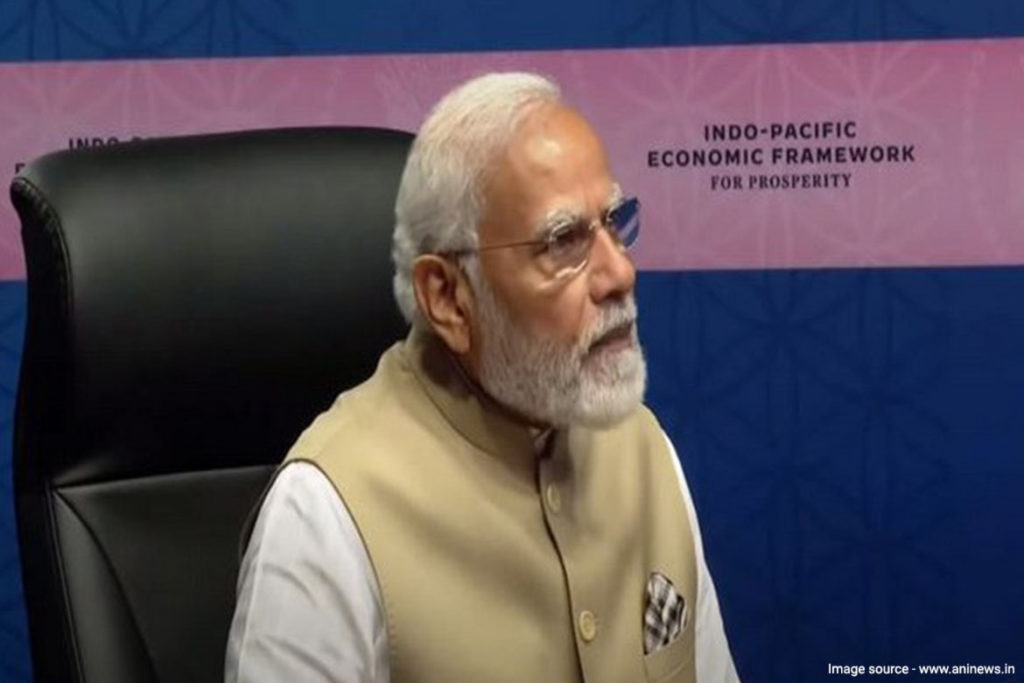In a message to an aggressively growing China that has been accused of unfair trade practises and economic coercion, India joined the Indo-Pacific Economic Framework on Tuesday, which aims an open, inclusive, linked, and secure Indo-Pacific for sustainable regional growth.
The Indo-Pacific Economic Framework, which was launched on Monday by US President Joe Biden and includes India, is Washington’s response to the Trans Pacific Partnership (TTP) and its successor agreement, the Comprehensive and Progressive Agreement for TTP (CPTPP), as well as the Regional Comprehensive Economic Partnership (RCEP). The United States did not join the 15-country RCEP led by China. Beijing applied to join the 11-member CPTTP last year. Taiwan and the United Kingdom have done the same. In the backdrop of this major move, let’s understand about IPEF, which can be a silver bullet for India.
What is IPEF?
It is a US-led programme aimed at strengthening economic partnerships among participating countries in the Indo-Pacific region to improve resilience, stability, inclusion, economic growth, fairness, and competitiveness. IPEF was founded with founding partners from 12 nations that together represent for 40% of global GDP.
It seeks to make the Indo-Pacific a key global economic growth destination. The Indo-Pacific area is home to more than half of the world’s population and more than 60% of global GDP, and countries that join this framework in the future will reap the same benefits by ensuring their participation in driving economic advancement.
Focus areas under IPEF:

Also read: World Around Us: 10 Major Events Of This Week
Rather than negotiating tariffs or market access, the IPEF framework will focus on integrating partner countries in four areas, which include the following objectives:
- Trade:
It aims to produce high-standard, inclusive, free- and fair-trade commitments, as well as new and innovative ways to trade and technology policy that advance a wide variety of goals that stimulate economic activity and investment. In addition, encouraging sustainable and inclusive economic growth helps employees and customers.
- Supply chains:
IPEF is dedicated to improve supply chains’ openness, diversity, security, and sustainability in order to make them more resilient and well-integrated. In times of crisis, coordinating response measures, broadening cooperation to better address and mitigate the consequences of disruptions to ensure business continuity, improving logistics efficiency and support, and essential raw material and processed goods. Ensure that materials, semiconductors, essential minerals, and clean energy technology are readily available.
- Clean energy, Decarbonisation, and Infrastructure:
The Paris Agreement aspires to accelerate the development and deployment of clean energy technology in order to decarbonize our economies and make them climate resilient. Making arrangements.
This entails improving technological cooperation, increasing competitiveness through technical assistance and concessional financing, and looking into ways to improve connectivity.
- Anti-Corruption and Taxation:
It promotes fair competition in the Indo-Pacific region by implementing an effective and comprehensive anti-tax, anti-money laundering, and anti-bribery system in conformity with current global tax evasion and corruption obligations, standards, and agreements.
This involves exchanging experience and looking into methods to help with capacity building so that accountable and transparent systems can advance.
Concerns for India:
The topic of data localisation has been a source of contention between India and the United States for the past two or three years. In 2019, the government submitted a bill in the Lok Sabha that would establish a framework for localising Indian data and a Data Protection Authority. Last month, the US said in its National Trade Estimate Report on Foreign Trade Barriers that India’s proposed data localisation requirements, which would require companies to store data within India, would create significant barriers to digital trade between the two countries and act as market access barriers, particularly for smaller businesses. If India still has reservations, it kept them to itself on this occasion, striking no discordant notes at the IPEF’s Tokyo debut on Monday.
